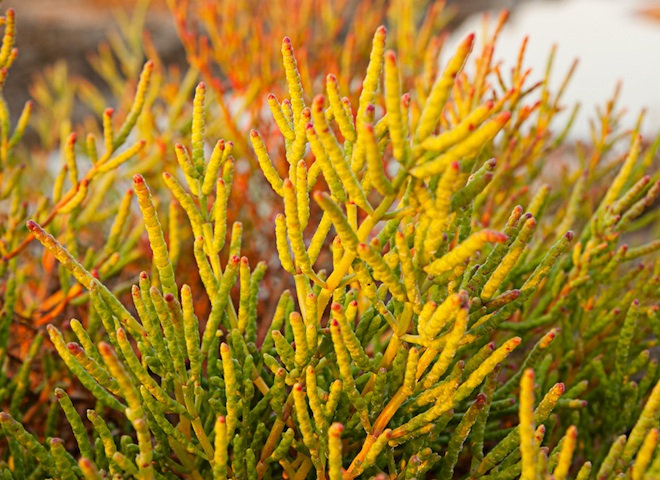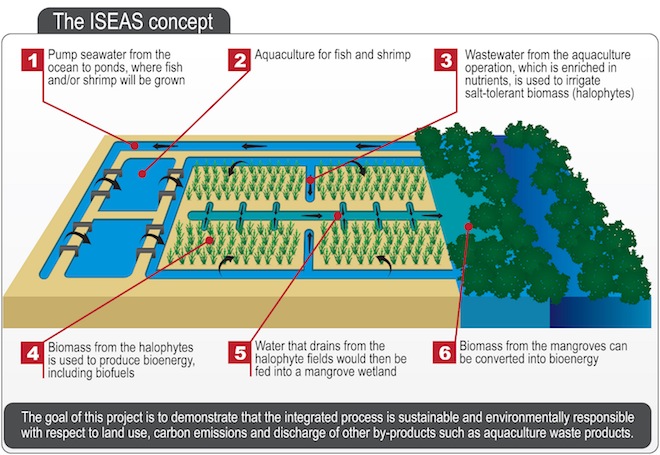In 2012, the world’s airlines transported three billion people, emitting 689 million tonnes of CO2 into the atmosphere. To mitigate the aviation industry’s future environmental impact, Boeing, Etihad Airways and the Masdar Institute of Technology are working on a groundbreaking new jet fuel made from desert plants fed with saltwater.
While the aviation industry only contributed two per cent of the world’s total CO2 emissions, its environmental impact is significant enough, and fossil fuels sufficiently infinite, that major airlines such as Boeing and Etihad are concerned to find new sources of clean energy.
On January 18 the group announced that they have discovered that halophytes (plants that can grow in saline conditions) fed with nutrient rich wastewater produce an efficient biofuel. The leftover water from this can then be used to feed mangrove forests, where it is purified before returning to the Persian Gulf.
(Related post: UN says aquaculture could solve fish collapse)
The Sustainable Bioenergy Research Consortium (SBRC), affiliated with MIST at Masdar City, announced plans to test two halophyte crops in the United Arab Emirates in 2014.
“Plants called halophytes show even more promise than we expected as a source of renewable fuel for jets and other vehicles,” said Dr. Alejandro Rios, Director of the SBRC. “The U.A.E. has become a leader in researching desert land and seawater to grow sustainable biofuel feedstocks, which has potential applications in other parts of the world.”
This new biofuel, grown in parts of the desert that can’t be used to produce food, is expected to emit up to 80 per cent less carbon throughout its lifecycle than conventional fossil fuels.
SBRC produced the above infographic, which demonstrates how seawater will be pumped into a fish or shrimp farm. The byproduct of that, which is rich with nutrients, will be used to nourish the halophytes, and that wastewater will in turn be purified by the UAE’s ubiquitous mangrove forests before returning to the Gulf.
“This project can have a global impact, since 97 percent of the earth’s water is ocean and 20 percent of the earth’s land is desert,” Dr. Rios said.
“Boeing is committed to finding ways to reduce aviation’s carbon emissions, and sustainable aviation biofuels is a key component of our strategy,” said Jeffrey Johnson, president, Boeing Middle East at the World Future Energy Summit during Abu Dhabi Sustainability Week.
“Masdar Institute’s biofuel research is showing tremendous potential, and we applaud Abu Dhabi’s leadership and innovation in this critical area.”
On January 18, Etihad Airways completed a test flight with a 777-300ER that was powered with in part with biofuel refined in the UAE.
Lead image of salt-tolerant halophytes / Shutterstock






“fossil fuels sufficiently infinite” – If only. I think you mean “fossil fuels sufficiently finite”.
This could be grown in the USA near salt lakes in California and Utah.
To prevent ecocide and extinction two things must be done soon:
1. Safely recycle 100% of all human-generated waste materials.
2. Gently reduce the human population with family planning programs.
Otherwise , the biosphere will collapse and the Earth will look like planet Mars
Why not just use SEAWATER and Sunlight ?
http://colossalstorage.net/API
Cheaper, infinite feedstock, highest production volumes, and large land tracts not needed.
@holoman
Because its too fake to be true.
If you have only a bit of a scientific background you should be laughing hard while reading all this stuff they propose on their website.
Honestly, they just want to ripp you off by selling wothless “Shares” of their all-brandnew-technology-company which doesn´t exist after all…
If Jonas had a bit of scientific background he will know it works.